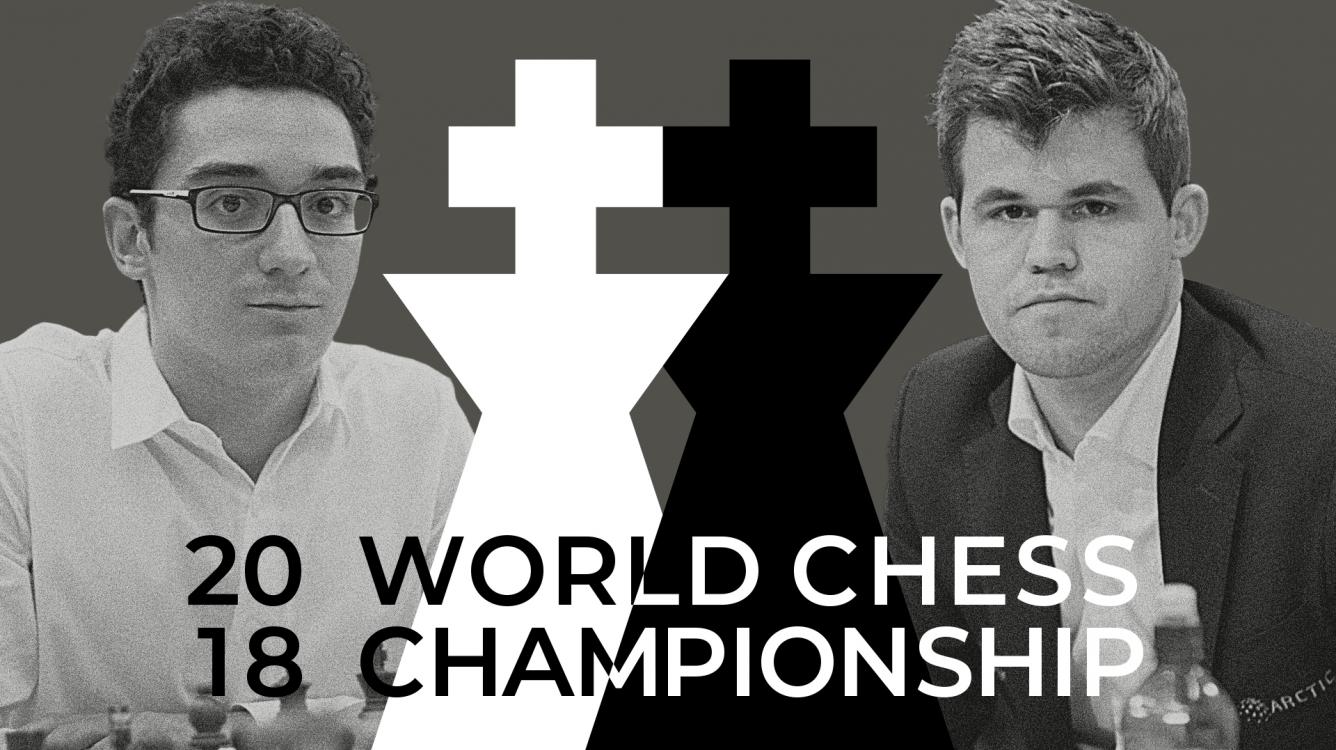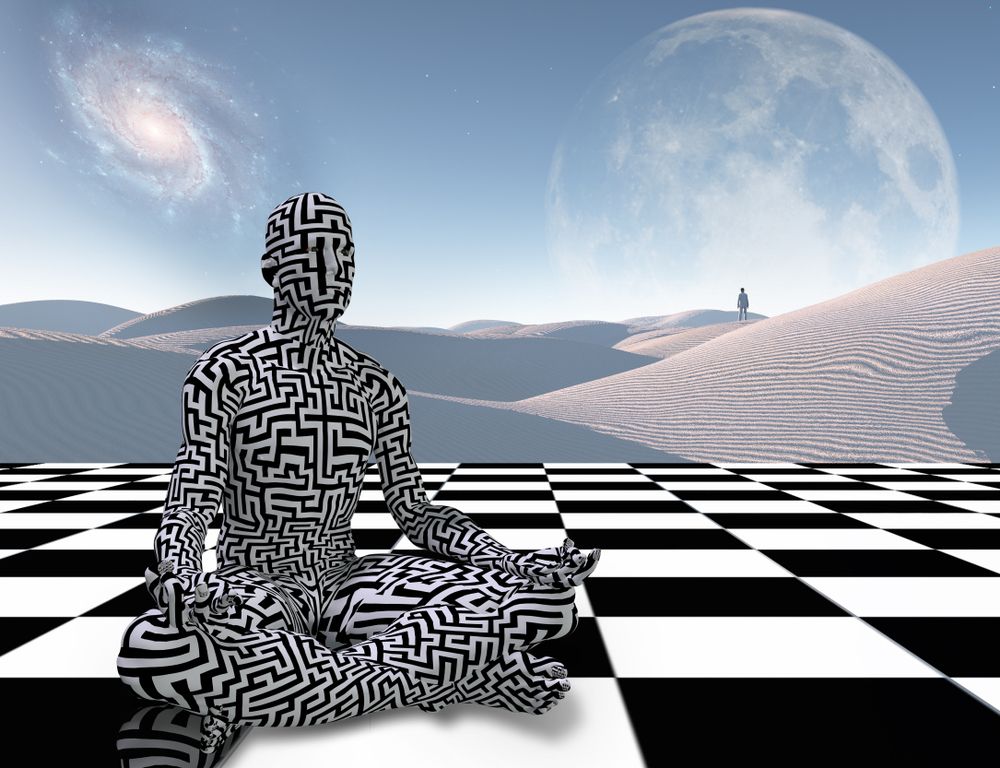
13 Things To Know About The Carlsen vs Caruana World Chess Championship
GM Jonathan Tisdall writes a preview of the world championship from a variety of perspectives.
1. The view from Norway
The shopping app for my corner grocery store announced today that there is a special on chess books this week. Of course they are the sort aimed for a general or beginner's market, but still. I have invitations to launch parties for the country's first chess pub, and I'm booked to appear as a studio guest on the live national broadcast—every second of every game will be prime-time viewing. This is what the chess world championship looks like in upside-down Norway.

Skagsanden beach, Lofoten islands, Norway.
Just five years ago, chess sets literally sold out across the country as Carlsen gave Norway its first world champion, and the increasingly inventive coverage by competing national broadcasters, with their engine swing-o-meters, confessionals, and heart rate monitors, means national productivity dips when Magnus is in action. This is the latest bit of cleverness to raise domestic adrenaline levels:
Jeg tror ikke engang sjakken selv så koblingen mellom punkrock og sjakk komme... Men her er den! #nrksjakk #carlsencaruana #9nov pic.twitter.com/uhU4FGC9hU
— Line Andersen (@LineAndersen4) October 26, 2018
2. Bizarro world
A favorite, memorable image of mine is watching a foreign visitor's face noticing that not only is chess being shown on prime-time TV, but the Premier League football scores are ticking across the bottom of the screen. What kind of madness is this?
When the title match between Magnus Carlsen and Fabiano Caruana kicks off in London in a few days, the chess world is anticipating a spectacle that deserves the word "historic." It has been 28 years since the championship match featured the top two rated players in the world, even rarer, that both are young and very near their prime.
There are all sorts of pundits currently dissecting the respective stats of the players, puzzling out what openings to expect, trying to guess possible mystery assistants in the background. If you've been following my approach to the elite beat, you'll know that I try to explore abstract angles, and particularly to reflect upon psychological and even philosophical factors affecting the combatants in this pressure cooker. Since I'm in Norway, the media focus is huge. Since Carlsen can't help spilling his guts if you ask him a question, there is a lot more intel to provide from the champion's side.
3. The winner
Let's focus briefly on the million-euro question: Who is going to win this thing? I'll be totally honest about this—I don't have a clue. Apparently the bookmakers agree, if this press release is anything to go by. I wouldn't even put money on it being close. Historic matches can surprise you. Those Kasparov-Karpov matches started with the supposedly waning champion taking a five-point lead. There's no script.
I think there are just a few pertinent factors in the statistical heap: Their ratings are virtually identical at the moment; and this is a match, not a tournament. Allow me to gradually make those ludicrously obvious statements confusing.
That this is the most evenly rated title match ever generates doubt about the outcome, and guarantees some nicely heated debates between opposing camps. I like a perverse argument, and I am inclined to toss out the idea that this numerical status is a reflection of the champion's dominance...and that it does nothing to rule out a clear challenger victory.
4. Not the gold standard
The live rating list has become compulsive viewing as Caruana steadily advances and Magnus treads water or bumbles around slightly. As they converge, I think one should keep in mind that the fixation on the number-one spot is very much based on the "Carlsen standard." We are now seeing a few players approaching this height...but that top number is noticeably below both Magnus' historical average market rate, and way below his peak value.
This in turn raises vital questions: Can Magnus truly be in a state of steady and permanent decline in his mid-to-late 20s? Is Caruana in a steady state of ascent towards "peak Magnus"? Not being clairvoyant, the first question is easier to tackle. It is very hard to buy the idea that Carlsen peaked at the age of 23...until you weigh in certain abstract mental factors and listen to a recent interview with his sister Ellen.
5. Revealing
A remarkable NRK podcast of pre-match interviews by Magnus chums Odin Blikra Vea and Askild Bryn resulted in some eye-openingly candid conversations. First, an hour of incredibly frank chat with the champ himself, much of which was translated by Tarjei Svensen here.
Wow, this is really gold. 1 hour exclusive podcast with @MagnusCarlsen being interviewed by two of his closest friends. Some fun anecdotes from his childhood. Too bad most of you guys don’t understand Norwegian. https://t.co/l1JCr8oYrB
— Tarjei J. Svensen (@TarjeiJS) October 23, 2018
Magnus analyzed his previous and near traumatic title defense vs. Karjakin, and offered frank opinions about the coming match, including: "Caruana is the worst opponent. He is the second best and the most difficult to play against. He is not the most difficult to beat as he takes risks, but along with Aronian, he is one I feel has outplayed me most."
The excerpts at the link above make astonishing reading. I cannot recall ever seeing such openness about everything from the assessment of their respective strengths and weaknesses, to his own fears and frailties. This may be down to the interviewers being good friends of his. I can't help wondering if it could indicate something more dangerous—that Magnus does not see the importance of psychological information.
6. Appetite?
As the two players have steadily converged rating-wise, the very natural result has been increasing doubt in the champion's superiority. First Vishy Anand expressed his surprise about how his conviction in Magnus' edge had evaporated, and a recent celebrity tweet made Caruana the favorite...while still ranking Carlsen as stronger.
Nonsense. Magnus is still ravenously hungry, and he will win. https://t.co/F76ygmHQWN
— Jonathan Rowson (@Jonathan_Rowson) October 23, 2018
I love a good retweet. You get the opinion of giants, and the disagreement of a different type of sage. Dr. Rowson was of course no shabby GM, and he is also the author of Chess for Zebras, a brilliant and perhaps unique kind of psychiatric course for improvement that I dearly wish had been written when I was young.
I'd like to disagree with everyone, though. I don't think this is a question of hunger.

OK, I won't dispute that Caruana can almost certainly be dubbed hungry. But I believe Carlsen is actually grappling with two different off-the-board factors. First, some background.
7. Perfectionism
When acting as the Norwegian team captain at the Baku Olympiad, I got to know Magnus a bit better, especially in regard to this tricky issue of his own standards. One memorable round, Magnus dispatched his opponent and while he was signing the scoresheets, another captain, a very strong GM, came up to me and praised Carlsen's play. I was then surprised when our usual post-game chat revealed Magnus' supreme irritation with the quality of his performance.
The first off-the-board factor that I believe is affecting Magnus, I am tempted to call...freedom. I wrote at some length early this year that I viewed his game against Gawain Jones at Tata as being profoundly significant. You'll remember that Magnus blundered a piece barely out of the opening, and a glance at the various snapshots of his body language leaves no doubt about the depth of his despair. After just a few inaccuracies, Jones granted Carlsen real compensation, and the Norwegian concluded the game with a virtuoso display of controlled attack. In the remainder of the tournament he converted micro-advantages ruthlessly, like the old "Maximum Carlsen."
At the time I saw this game as a kind of psychological death and rebirth: Hitting the rock bottom of a feeble blunder against the lowest-rated player in the event, and as a result, rediscovering the almost forgotten feeling of being able to play unfettered, with no pressure, with absolutely nothing to lose. He seemed to retain this liberation until the end—but not to have considered how to preserve or conjure up this freedom again.
Out of the blue, a journalist from the London Times contacted me for help with the chess content of a pre-match interview with Magnus. To my amazement, he said that Magnus had singled out his game with Jones as one of his most satisfying. This boggled my mind. The same Magnus who could be furious with himself for nano-inaccuracies now looked back affectionately on a game where he accidentally chucked a whole piece out the window?
Call me a psychobabbler, but this only "proves" to me that Magnus indeed experienced something profound during this game. But...I remain unconvinced that he, as someone wholly immersed in the sporting and aesthetic aspects of chess, gives much thought to the importance of abstractions like state of mind.
8. Fatigue?
Carlsen admitted in his podcast interview he has found holding the title harder than just being number one, and also how integral a part of his entire identity is tied up with being the best. But a later episode with elder sister Ellen heightened the drama. Incredibly, she believes that Magnus harbors a desire to relinquish the burden of playing title matches and keeping his number-one spot.
9. The zone
I picture Carlsen-loving jaws dropping around the country during this broadcast. Ellen described the frustration her brother endures, being unable to recapture what Norwegians like to call "the flow"—the smooth and easy momentum of top form. Speaking about the pressure at the top: "It becomes so tiring when you feel you don't quite have the flow. You know you're not playing as well as five years ago, even though you're just as good. But you can't regain the flow. It wears you down."
When she goes on to say "the chance of him retiring, short-term, is a real possibility" in the case of a Caruana victory, Norwegian listeners are surely thudding to the floor. Ellen even hints that since Magnus sees Fabiano as a worthy successor, this would soften the blow.
10. The art of not trying
Does this all sound like I might have a side bet on Fabiano? I'm really not so sure.
One of the few 2018 statistics in Carlsen's favor is the head-to-head vs. Caruana. London will not be a contest about who is better at beating other people up. I am inclined to think that in the heat of battle, the fierce desire to play perfectly will emerge as Carlsen's dominant mood. At the same time, I realize that the flip side of that is extreme self-induced pressure.
Magnus has always put a premium on being able to enter a bubble of security provided by close friends and family during title matches. I think he may need something more this time: a mental bubble, where he can play free from the weight of his own expectations and accomplishments.
11. Zen
Comparing the games of the two players over the past year, I think this contrasting aspect of calm is tangible. There is a straining, agitated feel running through many of Carlsen's games, where he appears to feel obligated, or entitled, to try to bend the laws of nature and shake points out of the board. Nature doesn't like that.

Caruana has had the smooth, unhurried calm that comes from a positive cycle of top form and success, where opponents become unnerved and points are harvested in a way that seems nearly organic, precisely because it is unforced. He goes with the flow. It's your job to make the mistakes.
12. Unburdened
The challenger has been able to prepare in relative peace, but his excellent interview revealed quite a bit, not just his calm confidence. I was particularly intrigued by his ability to be simultaneously polite and blunt when asked about working with So or Nakamura, and to serenely assess Magnus as the best player in the world, while making it clear he doesn't view this as much of a factor.
To my mind the key question and response was about match experience. Fabiano impressed with his direct discussion of the reply: "non-existent." Match experience is the most concrete and potentially pivotal difference between the players, and debutants visibly wobble when hitting the unprecedented nervous strain and frenzied public attention. Caruana said he "may have to adapt on the fly" to compensate. He's shown nerves of titanium when needed this year, but there's no maybe here—he should be mentally preparing to learn, fast and perhaps hard.
The truly significant factors in this match will be psychological. That's what I'd put money on.
13. Legacy
According to the NY Times, Caruana wonders about whether he can have a Magnus-like effect on the popularity of chess in the U.S. As someone who emerged during Fischer's march towards the title, and has somehow been caught up in the surreal state of chess in Norway, this triggers a wave of thoughts about the future.
Popularity is a tricky business. In many respects the U.S. seems to already be enjoying an enviable renaissance; the efforts of Rex Sinquefield in particular have transformed the country into a superpower with a conveyor belt of promising youngsters.
The sudden craze for chess in the north will be sorely tested if Magnus is dethroned and disillusioned. Since sister Ellen's scary warning only mentioned a "short-term" retirement, I believe we have more time even in a worst-case scenario, and there can never be the kind of traumatic reversal that Fischer's unique exit had on U.S. chess.
Magnus, with his fashion modeling and celebrity chums, has given chess a cool factor that no one could have dreamed possible. The crown must be heavy indeed if it might outweigh the fun he's been having.






